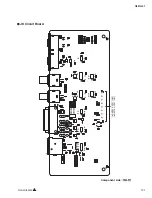
NEO-M8P - Hardware Integration Manual
UBX-15028081 - R05
Early Production Information
Product handling
Page 17 of 27
Repeated reflow soldering
Only single reflow soldering processes are recommended for boards populated with NEO-M8P modules. NEO-M8P
modules should not be submitted to two reflow cycles on a board populated with components on both sides in
order to avoid upside down orientation during the second reflow cycle. In this case, the module should always be
placed on that side of the board, which is submitted into the last reflow cycle. The reason for this (besides others)
is the risk of the module falling off due to the significantly higher weight in relation to other components.
Two reflow cycles can be considered by excluding the above described upside down scenario and taking into
account the rework conditions described in this section.
.
Repeated reflow soldering processes and soldering the module upside down are not recommended.
Wave soldering
Base boards with combined through-hole technology (THT) components and surface-mount technology (SMT)
devices require wave soldering to solder the THT components. Only a single wave soldering process is encouraged
for boards populated with NEO-M8P modules.
Hand soldering
Hand soldering is allowed. Use a soldering iron temperature setting equivalent to 350 °C. Place the module
precisely on the pads. Start with a cross-diagonal fixture soldering (e.g. pins 1 and 15), and then continue from
left to right.
Rework
The NEO-M8P module can be unsoldered from the baseboard using a hot air gun. When using a hot air gun for
unsoldering the module, a maximum of one reflow cycle is allowed. In general, we do not recommend using a hot
air gun because this is an uncontrolled process and might damage the module.
Attention: use of a hot air gun can lead to overheating and severely damage the module. Always
avoid overheating the module.
After the module is removed, clean the pads before placing and hand soldering a new module.
Never attempt a rework on the module itself, e.g. replacing individual components. Such actions
immediately terminate the warranty.
In addition to the two reflow cycles, manual rework on particular pins by using a soldering iron is allowed. Manual
rework steps on the module can be done several times.
Conformal coating
Certain applications employ a conformal coating of the PCB using HumiSeal
®
or other related coating products.
These materials affect the HF properties of the GNSS module and it is important to prevent them from flowing
into the module. The RF shields do not provide 100% protection for the module from coating liquids with low
viscosity; therefore, care is required in applying the coating.
Conformal Coating of the module will void the warranty.
Casting
If casting is required, use viscose or another type of silicon pottant. The OEM is strongly advised to qualify such
processes in combination with the NEO-M8P module before implementing this in the production.
Casting will void the warranty.











































